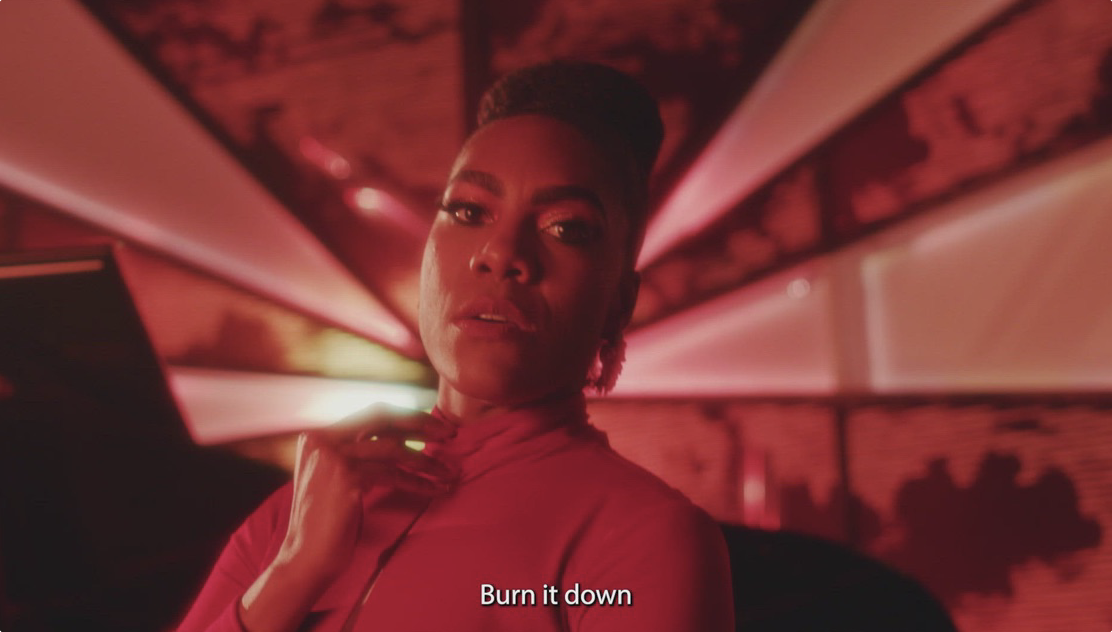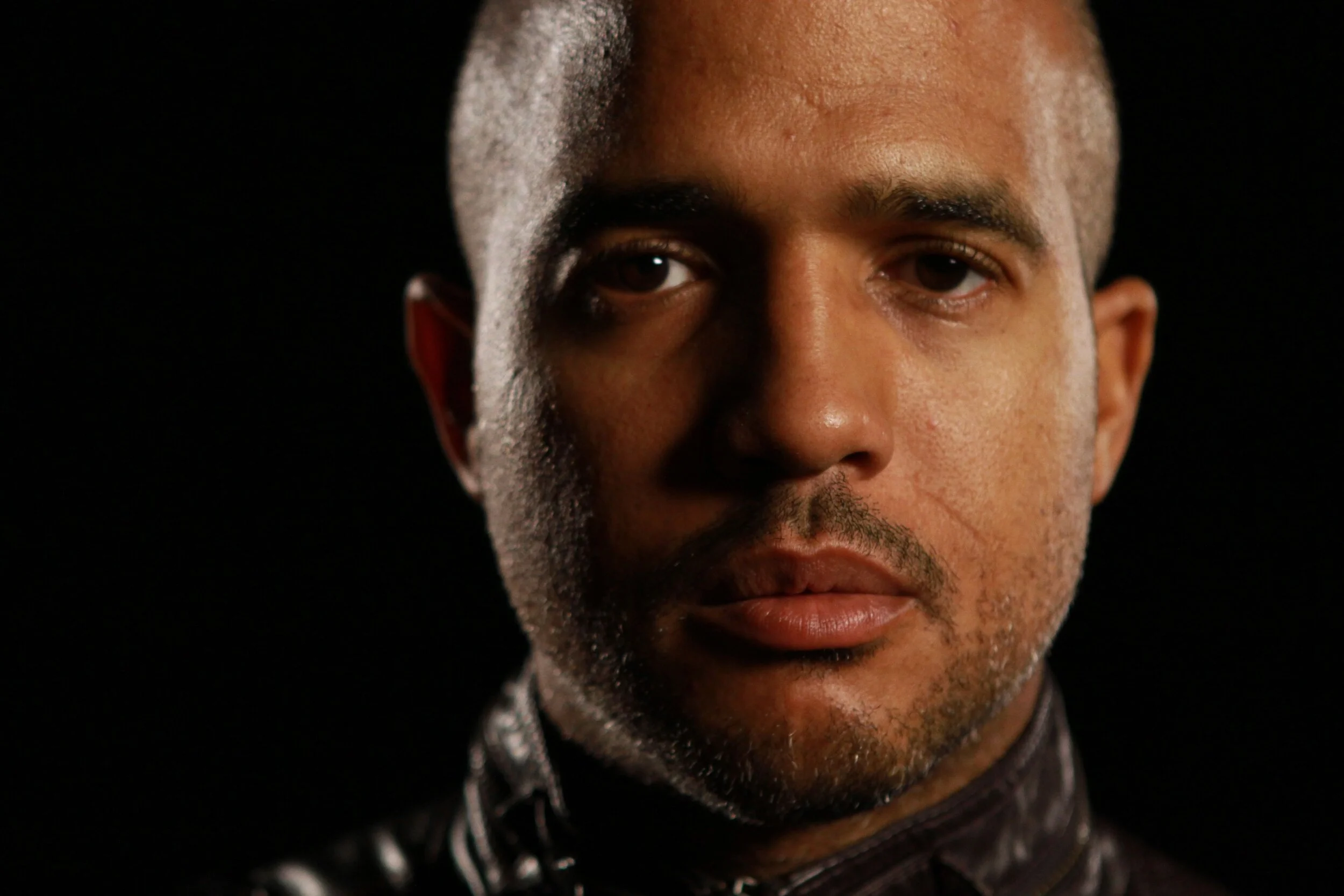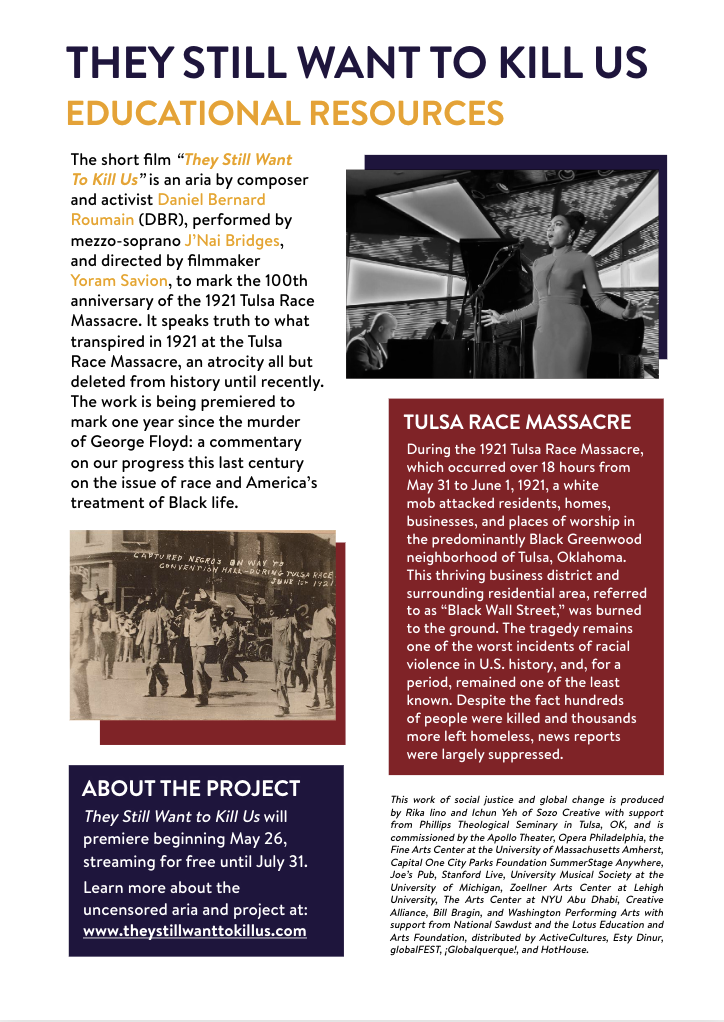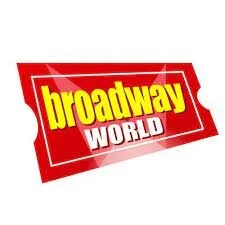THEY STILL WANT TO KILL US
THEY STILL WANT TO KILL US
DANIEL BERNARD ROUMAIN (DBR) + J'NAI BRIDGES
Calling it a “work of social justice and global change,” composer and activist Daniel Bernard Roumain (DBR) created “They Still Want to Kill Us”, an aria featuring mezzo-soprano J’Nai Bridges, to mark the 100th anniversary of the 1921 Tulsa Race Massacre. Bright Shiny Things is proud to release the single version to mark the 101st anniversary of the Massacre, an atrocity all but deleted from history until recently. DBR states, “Violence against BIPOC people is part of our American history… Together, we can fight back and find love among the willing.” Proceeds from this release will be donated to Castle of Our Skins and may be shared with other BIPOC artists and organizations working in classical music and the performing arts.
ORDER NOW FROM BRIGHT SHINY THINGS
Proceeds from this release will be donated to Castle of Our Skins and may be shared with other BIPOC artists and organizations working in classical music and the performing arts.
WATCH THE VIDEO
Featuring mezzo-soprano J'Nai Bridges
Composed and performed by Daniel Bernard Roumain (DBR)
Directed and edited by Yoram Savion
Assistant director Anna-Sharé Blake
Produced by Rika Iino, Ichun Yeh and Jamilla Deria
This work of social justice and global change is executively produced by Rika Iino and Ichun Yeh of Sozo Creative with support from Phillips Theological Seminary in Tulsa, OK, and is commissioned by the Apollo Theater, Opera Philadelphia, the Fine Arts Center at the University of Massachusetts Amherst, Capital One City Parks Foundation SummerStage Anywhere, Joe's Pub, Stanford Live, University Musical Society at the University of Michigan, Zoellner Arts Center at Lehigh University, The Arts Center at NYU Abu Dhabi, Creative Alliance, Bill Bragin, and Washington Performing Arts with support from National Sawdust and the Lotus Education and Arts Foundation, distributed by ActiveCultures, Esty Dinur, globalFEST, ¡Globalquerque!, and HotHouse.
ABOUT THE WORK
Bright Shiny Things, in partnership with composer/violinist/activist Daniel Bernard Roumain (DBR), GRAMMY® award-winning mezzo-soprano J’Nai Bridges and Sozo, is proud to release the digital single and video of DBR’s “They Still Want to Kill Us", an aria sung by Bridges, to mark the 101st anniversary of the 1921 Tulsa Race Massacre. The video features performances by Bridges and Roumain intercut with archival film footage and images telling the story of the Massacre in an ominous shorthand. All proceeds from the audio and video sales of this release will be donated to Castle of Our Skins and may be shared with other BIPOC artists and organizations working in classical music and the performing arts.
Roumain and Bridges spoke about the twin goals of this release: to increase awareness of the 1921 Massacre and to raise up BIPOC voices working in classical and opera today.
Bridges says, “As an artist, I have a duty to spread awareness and knowledge and to be an ambassador for humanity. This is a piece that directly aligns with my role in the world. I feel like I have this gift of voice that instantly has the power to connect with people in a way that other things don’t. We don’t learn about the Tulsa Massacre in school. I have the responsibility to help people to open their minds and hearts, because in school we are just not taught a lot about the dark history of our country. I feel like the healing can’t happen until we know what we’re working with.”
Roumain adds, “At its best, opera is about telling stories. The question is which stories are going to be told. I love the notion of Black people and Black artists telling their stories, with their voices, in their words, with their people, for their audiences - and everyone else can come in, too.”
Roumain is currently developing a pocket opera based on the Massacre, in conjunction with Sozo Creative. Find out how you can help.
Daniel Bernard Roumain, Composer Statement:
What happened to American citizens on May 31, 1921 in Tulsa, Oklahoma was a massacre by white people perpetrated upon Black people. A toxic mix of misinformation, bigotry, ignorance, and white rage ignited a race war that left hundreds dead and a nation still struggling for its identify. My son is biracial and I wonder and worry about his own fight for freedom and justice and self-identity in a country where we cannot agree on a shared morality.
It seems to me some white people still want to kill us (Black people) and the murder of Breonna Taylor and George Floyd and so many others is evidence of this blood lust sewn deep within the depraved, American psyche. Violence against BIPOC people is part of our American history, and the AAPI, the BIPOC, the LGBTQIA+, the disabled, and all those opposed to the privileged, global majority have always faced a choice: be still and silent or lift up your voice and move mountains!
The audacity and hypocrisy to ask God to bless America is not lost on me or many of my friends. God Damn America has its place. We all choose to move mountains and create new spaces for our communities. This is the work of social justice and global change.
What are the words and methods of The New Racism? Everyday we are witness to it. Together, we can fight back and find love among the willing.
DBR
Brooklyn, NY
ARTIST TALK
DBR and J’Nai speak with Jamilla Deria, Director of UMass Fine Arts Center, about the importance of this project.
Photo by Christine Turner
About Daniel Bernard Roumain (DBR)
Daniel Bernard Roumain (DBR) is a prolific and endlessly collaborative composer, performer, educator, and social entrepreneur. “About as omnivorous as a contemporary artist gets” (New York Times), DBR has worked with artists from Philip Glass to Bill T. Jones to Lady Gaga; appeared on NPR, American Idol, and ESPN; and has collaborated with the Sydney Opera House and the City of Burlington, Vermont. Acclaimed as a violinist and activist, DBR’s career spans more than two decades, earning commissions by venerable artists and institutions worldwide. dbrmusic.com
Photo by Freddie Collier
About J’Nai Bridges
Grammy-award-winning, mezzo-soprano J’Nai Bridges is a leading figure in classical music’s shift toward conversations of inclusion and racial justice. The ‘21-’22 season alone has seen Bridges’ ascent into the sphere of new music- taking on several world-premieres, but continuing to lend her “plush-voiced mezzo-soprano” (The New York Times) to the traditional roles. She is one of the Kennedy Center’s NEXT 50 leaders of cultural diversity. jnaibridgesmezzo.com

GET THE SCORE
GET THE SCORE
THEY STILL WANT TO KILL US
Music and Words by Daniel Bernard Roumain
Greenwood
Black Wall Street
Black Oil
Green Money
A young man
Mr. Rowland
A younger woman
Ms. Page
Stumbled upon one another
In that elevator everything changed
May 31, 1921
18 hours
A white mob
Engulfed with white rage
Burn it down
Burn it all down
A white man runnin’ with red blood on his hands
Bring it down
Bring it all down
A school, the library, our hospital, my church
Burn it down
Burn it all down
My people, our Black children, our stores, our homes
They want to kill us
They still want to kill us
God Bless America
God Damn America

READING LIST:
Ages 2-8
1) Opal's Greenwood Oasis by Quraysh Ali Lansana, Najah-Amatullah Hylton, and Skip Hill (Illustrator)
2) Tulsa Girl by Shameen Ebony Anthanio-Williams and Sergio Drumond (Illustrator)
Ages 8-12
1) Aamila's Adventure: Remembering the 1921 Tulsa Race Massacre by Tara Henderson
2) Dreamland Burning by Jennifer Latham
3) Unspeakable: The Tulsa Race Massacre by Carole Boston Weatherford and Floyd Cooper (Illustrator)
4) Up From The Ashes by Hannibal Johnson and Clay Portis (Illustrator)
Young Adult and Adult
1) Across the Tracks: Remembering the Tulsa Race Massacre and Black Wall Street by Alverne Ball, Stacey Robinson (Illustrator), and Reynaldo Anderson (Contribution)
2) Black Birds in the Sky: The Story and Legacy of the 21921 Tulsa Race Massacre by Brandy Colbert
3) Black Wall Street: From Riot to Renaissance in Tulsa's Historic Greenwood District by Hannibal B. Johnson
4) Black Wall Street 100: An American City Grapples With Its Historical Racial Trauma by Hannibal B. Johnson
5) Death in a Promised Land: The Tulsa Race Riot of 1921 by Scott Ellsworth and John Hope Franklin (Foreword)
6) Finding Greenwood by K T Alozie
7) Fire in Beulah by Rilla Askew
8) Reconstructing the Dreamland: The Tulsa Riot of 1921: Race, Reparations, and Reconciliation by Alfred L. Brophy and Randall Kennedy (Foreword)
9) Riot on Greenwood: The Total Destruction of Black Wall Street by Eddie Faye Gates
10) The Burning: The Tulsa Race Massacre of 1921 by Tim Madigan
11) The Fires of Greenwood: The Tulsa Riot of 1921 by Frederick Williams
12) The Ground Breaking: An American City and Its Search for Justice by Scott Ellsworth
13) The 1921 Tulsa Race Massacre, Volume 1: A Photographic History by Karlos K. Hill and Kevin Matthews (Foreword)
14) The Nation Must Awake: My Witness to the Tulsa Race Massacre of 1921 by Mary E. Jones Parrish, Anneliese M. Bruner (Afterword), and John Hope Franklin (Introduction)
15) The Tulsa Massacre of 1921: The Controversial History and Legacy of America's Worst Race Riot by Charles River Editors
16) The Victory of Greenwood by Carlos A. Moreno
17) Tulsa, 1921: Reporting a Massacre by Randy Krehbiel and Karlos K. Hill (Foreword)
18) Tulsa Race Riot: A Report by the Oklahoma Commission to Study the Race Riot of 1921 by Oklahoma Commission to Study the Riot of 1921
19) Tulsa Race Massacre of 1921: The History of Black Wall Street, and its Destruction in America's Worst and Most Controversial Racial Riot by World Changing History
20) Tulsa, 1921: Reporting a Massacre by Randy Krehbiel and Karlos K. Hill (Foreword)
LET'S TAKE ACTION AND BUILD THIS WORK TOGETHER.
The aria, THEY STILL WANT TO KILL US, was originally commissioned by Tulsa Opera to commemorate the 1921 Tulsa Race Massacre. Thanks to the support of our institutional partners nationwide, we’ve created an aria film. We’re now looking to build a consortium of loving Partners-in-Creation to realize a pocket opera. If you’d like to play a role in this work, contact us below to start a conversation!
MAKE A TAX-DEDUCTIBLE DONATION.
THEY STILL WANT TO KILL US is a fiscally sponsored project of Sozo Impact, a 501(c)3 organization, dedicated to amplifying the voices of underserved communities and effecting a positive shift through the arts. Donations made to Sozo Impact are tax deductible to the full extent allowed by law. Portions of all donations will support BIPOC artists in the operatic field.
IN THE NEWS
(On mobile devices: swipe for more coverage)



















